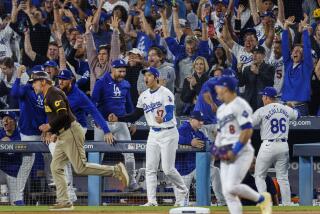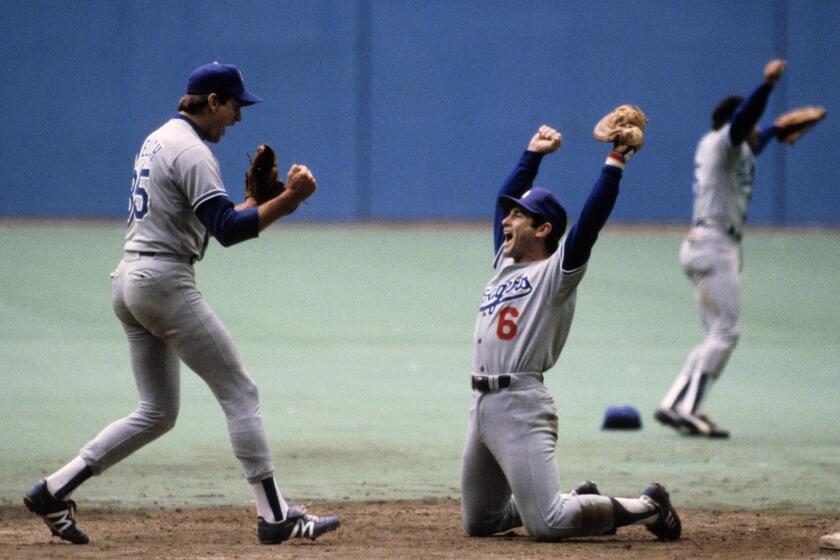Scully Serves as Our Eyes for Our Ears
A confession.
During this pennant race, my favorite food is fresh pork sausages made by an odd-looking horticulturist named John.
My favorite singing group is The Harry Simeone Songsters.
My favorite number is 79.
And my favorite player is Vinny.
“Let’s go . . . batter up . . . we’re taking the afternoon off. . . .
Those voices raising a hullaballo from Walla Walla, Washington, to Kalamazoo before every Dodger radio broadcast--the Simeones, of course--they aren’t the only ones.
During this pennant race, the prettiest sight in town is no further away than your dashboard or nightstand.
One reason is that when it comes to televising games, the Dodgers are sadly still living in the 1950s.
A bigger reason, though, is that their top radio announcer is delightfully speaking from the same era.
Vin Scully for MVP. Again.
In his 46th season, Scully was hard at work again Monday. It was one of three pennant-race games during the seven-game trip that, incredibly, will not be on television in Los Angeles.
The Dodgers defeated the host Colorado Rockies, 6-4, in an early-evening game that most people probably caught on the car radio or at home while watching a muted “Monday Night Football.”
But on Wednesday and Thursday, well, remember those days when you would sneak a transistor radio into school?
Prepare to relive.
On Wednesday at 12:05 p.m., and Thursday at 2:05 p.m., radio will the only option for the average local fan wishing to hear games from Colorado and San Diego.
Not that they wouldn’t consider it their No. 1 option anyway.
Nowhere else, and in no other time, has one baseball announcer been worthy of the sentence that best describes Scully’s impact here:
He can fill a stadium, and he can empty it.
“Vinny has made more fans of the Dodgers than anyone,” said Peter O’Malley, Dodger owner who listens to Scully with a transistor and earpiece.
Even in restaurants.
“Especially in restaurants,” O’Malley said.
Scully also taketh away. Sociologists have long contemplated why fans leave Dodger Stadium before the end of games like nowhere else, but the answer is simple.
With Scully on their car radio, they don’t feel they are going anywhere.
In recent years, Scully has missed an increasing number of radio innings because of breaks, vacations and TV commitments. A commuter crisis should be defined as driving across town during the middle of a game and not hearing him once.
Not to worry. It’s pennant-race time, and he’s back, stronger than ever, lighting up the dial for all but 27 minutes of Monday’s 2:47 game.
What does he do best? Well, that’s just it. He doesn’t do anything.
He just is, a red-headed fella with a vivid imagination watching a game from the top row, talking over the fence to those who don’t have a ticket
Take Monday.
The Dodgers didn’t merely begin the most important seven-game trip of the year.
“They broke the seal on their last road trip of the season,” Scully said, proving again that he views baseball like a fine wine.
Reams have been written about the effect of the next three days on the pennant race. Vinny did it in one sentence.
“The Dodgers know full well that while they are arm-wrestling with the Rockies, the Padres should be having a soft touch with the Giants.”
A plate appearance by Rocky Eric Young should not be discounted merely because he doesn’t hit homers.
“If he gets aboard, a rabbit is loose,” Scully said of the quick Young.
And when he gets upset with a player? It’s not what he says, it’s what he doesn’t say.
After he called Raul Mondesi killing an early rally with a first-pitch ground ball, there was a long pause.
It was this pause that caused alarm among Dodger fans in 1991 while Scully was broadcasting spring training appearances by Fernando Valenzuela.
Before the end of camp, Valenzuela was released.
“Mondesi--typically a first-ball hitter--hits into a force play,” Scully said with a sigh, pausing not only before the sentence, but between phrases.
Some first-ball hitters can still leave him feeling poetic.
“With [Vinny] Castilla, the first word is, “Lookout! . . . 29 of his 39 home runs have come on the first pitch.”
And talk about strategy. In past years, some insiders have felt that Scully actually had input into the makeup of the team. The Dodgers could certainly do worse.
“He’s gonna send DeShields’ in--because [Ismael] Valdes is coming up next--and he scores!” Scully said, referring to third-base coach Joe Amalfitano.
Few announcers notice that a runner is sent on a risky play because a pitcher is up next, not to mention working it in the same breath as the call.
Later in the broadcast, he noted that Colorado’s Quinton McCracken attempted a bunt during a steal merely to “distract” catcher Mike Piazza.
Then there were his marvelous description of the routine.
A check-swing strikeout--”[Ellis Burks] started to swing, held up, and now he’s sorry he didn’t.”
The scene by home plate during a delay on the pitching mound --”Galarraga’s left leg is crossed in front of his right, he is leaning on his bat . . . and standing to his right, not speaking to him, is Mike Piazza.”
A pitcher facing a rally--”Valdes is like a bullfighter, looking at those horns.”
And--”This is a mountain range for Valdes to climb.”
In less than three hours Monday, balls were “whacked,” “kicked,” “wailed,” and “golfed.”
And listeners were wowed. Again.
Don’t call on Tuesday and Wednesday. Taking the afternoon off.
More to Read
Are you a true-blue fan?
Get our Dodgers Dugout newsletter for insights, news and much more.
You may occasionally receive promotional content from the Los Angeles Times.










